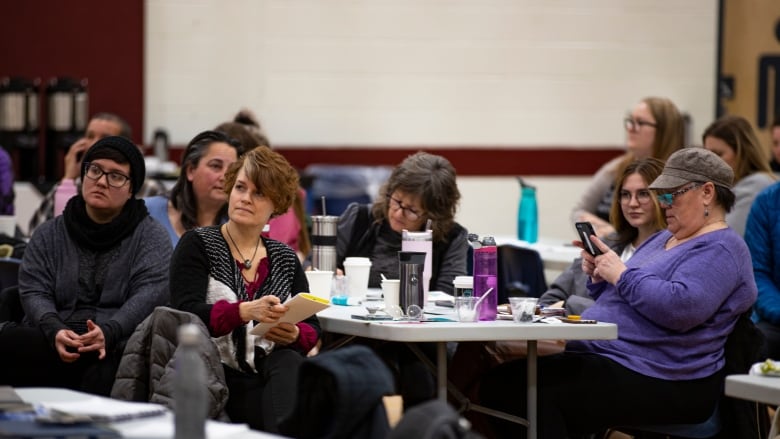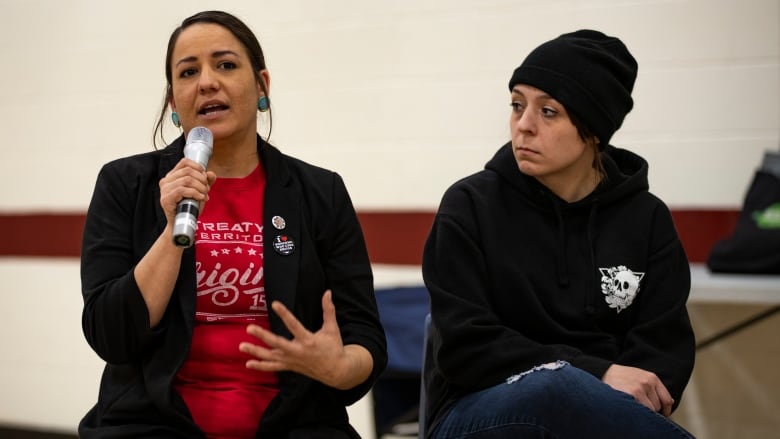Fight against sexual exploitation in Brandon relies on community connection, conference hears
Sexual exploitation and trafficking is a problem that often goes unnoticed in Manitoba's second-largest city — and it's one that needs to be addressed through a community effort, a conference in Brandon heard Friday.
“People think of us as a small town with small-town problems, but we're not — we're a small city with big-city problems,” said Lisa Noctor, co-chair of the Westman Team Against Sexual Exploitation and one of the speakers at the Manitoba Sexual Exploitation and Trafficking Awareness conference at Assiniboine Community College in Brandon on Friday.
“We don't just have exploitation and trafficking of adult women here in Brandon, but this is happening with children as well,” she said.
“It's happening in our most marginalized of communities and it's happening in spaces that people don't realize and don't … think truthfully exist here.”
Noctor is also the co-ordinator with GAP, or the Gakina Abinoojiiyag Program — an outreach and homelessness prevention program for vulnerable youth operated by the Brandon Friendship Centre.
Building relationships with youth can help address sexual exploitation and trafficking in the city, she said.

Janis Irvine, the co-ordinator with Brandon's Community Mobilization Westman — a network of social service providers — also said people who are exploited can find safety through people in the community who offer help and role modelling.
These connections are essential when it comes to addressing sexual trafficking and exploitation in the community, she said.
“I think sex is an uncomfortable conversation … and I think we don't want to talk about these things happening in our community because we wanna believe we're better than that,” said Irvine.
“I'm not sure that people know that we need a better system to kind of support those quick ‘I need some place to just sit and be safe' [situations].”
Irvine spoke at Friday's conference on a panel with Brandon Bear Clan outreach worker Jade Gamblin, sharing first-hand experience about the issues facing the city and province.
Bear Clan patrols in downtown Brandon have encounters with people who have been trafficked, Gamblin said. There are signs to look for, but it can be hard to immediately identify.
Showing a friendly face and letting people know there are helpers if they need them can make a major difference in the community, she said.
“It's here. You can't ignore it,” said Irvine.
“If you're in a position where you can help, start talking to your collaborative circle. Start talking to people. Share information. Don't be afraid,” she said.
“It could protect a young man or young woman from being exploited. We have to start talking to each other, because everybody holds a little tiny piece of the puzzle.”
Role models and helpers needed
Irvine says service providers and helpers serve as role models for the vulnerable people they work with. The relationships they form are critical in helping break the cycle of sexual exploitation and trafficking.
“If we as a community are not taking care of some of the basic needs of our community members … if there's a breakdown in our families that they're not providing that, then our young people are gonna go look for that somewhere,” she said.
“There's a whole world of unhealthy people that are working really hard to get our young ladies and our young men. So we have to work twice as hard.”

Noctor says this week's conference restarted and renewed conversations by bringing together people from all walks of life to work with victims and survivors of exploitation and trafficking.
Her hope is that the conference will show people that anyone can make a difference in helping to fight sex trafficking.
In many cases that help can come from people with lived experience, Irvine added, who can relate to victims of exploitation and show them there are safe places and people to turn to.
That's why finding both men and women in the community to serve as role models and create bonds with those in need is vital, Noctor said.
“Some of us are born with those gifts and it's important that we share those gifts,” she said. “And that panel was really a true demonstration of helpers.”
This “Eyes on Trafficking” story is reprinted from its original online location.
 ABOUT PBJ LEARNING
ABOUT PBJ LEARNING
PBJ Learning is a leading provider of online human trafficking training, focusing on awareness and prevention education. Their interactive Human Trafficking Essentials online course is used worldwide to educate professionals and individuals how to recognize human trafficking and how to respond to potential victims. Learn on any web browser (even your mobile phone) at any time.
More stories like this can be found in your PBJ Learning Knowledge Vault.
EYES ON TRAFFICKING
This “Eyes on Trafficking” story is reprinted from its original online location.
ABOUT PBJ LEARNING
PBJ Learning is a leading provider of online human trafficking training, focusing on awareness and prevention education. Their interactive Human Trafficking Essentials online course is used worldwide to educate professionals and individuals how to recognize human trafficking and how to respond to potential victims. Learn on any web browser (even your mobile phone) at any time.
More stories like this can be found in your PBJ Learning Knowledge Vault.
